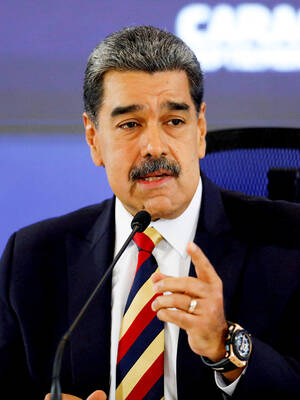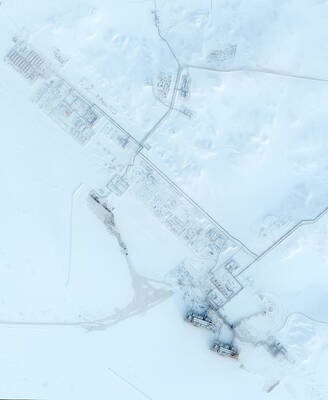Bolivian President Evo Morales said on Thursday he was ready to withstand a national vote of confidence that was pushed through the opposition-run upper house of parliament.
“This decision will give back to the Bolivian people the decision to say whether they are in favor of the process of change and justice or for the return to the past,” said Morales, who was elected Bolivia’s first indigenous president in 2005.
The referendum would require Morales, who won the presidency with 53.7 percent of the vote, and Bolivia’s nine state governors to win both more votes and a greater percentage of support than they did in 2005 ballot. If they fall short, they will have to run again in a new general election.
On Sunday, a large majority in the province of Santa Cruz — the richest in the country — approved a proposal for more autonomy from the leftist government in a non-binding referendum, which Morales deemed illegal.
Congress on Thursday passed the bill ordering the recall be held within 90 days and will ask, “Do you agree with the continuation of the process of change led by President Evo Morales Ayma and Vice President Alvaro Garca Linera?”
Morales said he would sign the measure as soon as it reaches his desk.
Morales called governors to urgent talks over mounting autonomy demands.
But the governors of the eastern lowland regions of Tarija, Beni and Pando, which plan autonomy referendums before the end of June, said they would not meet with Morales until after their votes.
Morale asked for all of Bolivia’s nine regional governors to meet with him on Monday to avoid further division.
The referendums put the eastern part of the country in conflict with the western highlands where Morales, a leftist and Bolivia’s first indigenous president, has his support base.
“This Bolivian family cannot be divided,” Morales said in Santa Cruz just days after his supporters clashed with autonomy backers in the referendum. “Autonomy must be for all Bolivians, with social justice, not autonomy just for groups.”
The Senate in a surprise session on Thursday passed the controversial law calling for a series of recall elections that could either ratify the mandates of Morales and the governors or possibly vote them out of office.
The recall vote must be held within three months.
He sent the recall initiative to Congress in December, where it quickly passed the lower house, which is controlled by his party, but was held up for months in the opposition-dominated Senate. At the time, Morales saw a recall as a way to show his high level of popularity and ratify his presidency.
But now the opposition has decided to pass the bill, seeing it as a challenge to Morales and the governors as they bicker over the autonomy issue.
“This is an alert to prefects, authorities, everyone, to make them see they need to seek a consensus,” Roger Pinto, head of the opposition bench in the Senate, told reporters.
Opposition leaders say they will only attend talks with Morales if the government gives a clear signal that it will respect the autonomy votes.

VENEZUELAN ACTION: Marco Rubio said that previous US interdiction efforts have not stemmed the flow of illicit drugs into the US and that ‘blowing them up’ would US President Donald Trump on Wednesday justified a lethal military strike that his administration said was carried out a day earlier against a Venezuelan gang as a necessary effort by the US to send a message to Latin American cartels. Asked why the military did not instead interdict the vessel and capture those on board, Trump said that the operation would cause drug smugglers to think twice about trying to move drugs into the US. “There was massive amounts of drugs coming into our country to kill a lot of people and everybody fully understands that,” Trump said while hosting Polish President

Japan yesterday heralded the coming-of-age of Japanese Prince Hisahito with an elaborate ceremony at the Imperial Palace, where a succession crisis is brewing. The nephew of Japanese Emperor Naruhito, Hisahito received a black silk-and-lacquer crown at the ceremony, which marks the beginning of his royal adult life. “Thank you very much for bestowing the crown today at the coming-of-age ceremony,” Hisahito said. “I will fulfill my duties, being aware of my responsibilities as an adult member of the imperial family.” Although the emperor has a daughter — Princess Aiko — the 23-year-old has been sidelined by the royal family’s male-only

A French couple kept Louise, a playful black panther, in an apartment in northern France, triggering panic when she was spotted roaming nearby rooftops. The pair were were handed suspended jail sentences on Thursday for illegally keeping a wild animal, despite protesting that they saw Louise as their baby. The ruling follows a September 2019 incident when the months-old feline was seen roaming a rooftop in Armentieres after slipping out of the couple’s window. Authorities captured the panther by sedating her with anesthetic darts after she entered a home. No injuries were reported during the animal’s time on the loose. The court in the

Another tanker carrying liquefied natural gas from Russia’s sanctioned Arctic LNG (liquefied natural gas) 2 project has docked in a Chinese port, ship-tracking data showed, days after Russian President Vladimir Putin met Chinese President Xi Jinping (習近平) in Beijing. The London Stock Exchange Group (LSEG) tracking data indicated the Russian Voskhod LNG tanker was anchored at an LNG terminal in the port of Tieshan in Guangxi, China. The Russian flagged tanker, with a cargo of 150,000 cubic meters of LNG, was loaded up at the Arctic LNG 2 facility in Gydan in northern Siberia on July 19, LSEG data showed.